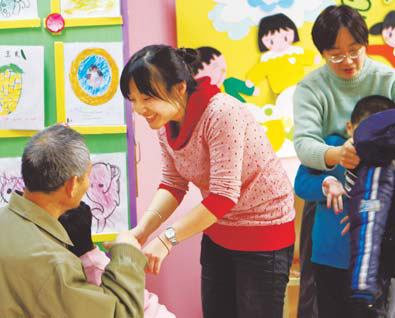Focus
Small salaries, large workload for teachers
(China Daily)
Updated: 2010-12-27 07:55
 |
Large Medium Small |
|
Li Yan (center) talks with a parent of an autistic child after a class on Dec 21. Some 90 percent of people with autism face difficulties in going to ordinary schools or getting jobs. |
Editor's note: Li Yan, 26, is a Beijing Normal University graduate who teaches children with autism at Anhua Intelligence Training School in Beijing, a State-funded vocational school.
Working with children with autism requires a lot of patience. They often only concentrate on their own world and ignore what is going on with other people, even their parents.
Teachers need to find something that interests a child. That way, you build the intimacy and trust. They will just ignore everything you say otherwise.
A child will not respond to a red toy if he or she only likes yellow toys.
The real difficulty, though, lies in the fact that all autistic children are different from each other, which means teachers have to adjust their plans to ensure efficiency.
Last year, the school didn't have any teaching manuals so my colleagues and I had no option but to compile lesson plans the night before class. The work can be very tiring, and you'll often find teachers falling asleep on the bus on their way home.
Despite a more complex workload, we're not paid any more than standard teachers. The authorities give special education teachers a subsidy (10 percent of their monthly salary) but that works out at only about 100 yuan ($15).
After paying the rent and other bills, I can usually only save about 20 percent of my 3,000-yuan monthly salary. About half of the nine teachers (at Anhua School) are planning to get married in the next few years, so they need to save more money.
I chose the special education major at university because I thought it is very meaningful, that we can make a difference for children with learning difficulties.
However, I do think we're underpaid and it should be improved to give us a better life, and to encourage more people to take up the job. (The number of special education majors enrolled at Beijing Normal University fell by half between 2007 and 2009, from 16 to just 8.)
Li Yan was talking to Hu Yongqi.
